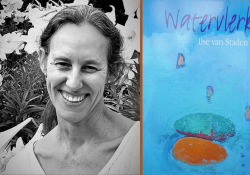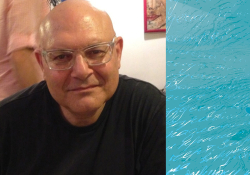An Interview with Clemens Setz
Clemens Setz is a young Austrian poet, novelist, magician, jazz pianist, and mathematician. His novelDie Frequenzen (Frequencies) was shortlisted in 2009 for the German Book Prize, Germany's most prestigious literary award, and his poetry and prose have also received the Ernst-Willner-Preis (2008), the Bremer Literaturpreis (2010), and the Outstanding Artist Award (2010). Two poems by Setz, translated by Peter Constantine, appear on page 12 of the November 2010 issue of WLT, and a review of Die Frequenzenappears on page 65 of the same issue. To complement the poems, Peter Constantine recently spoke to Setz about the play of poetry and prose in his work, in addition to his other talents as a mathematician, pianist, and magician.
Peter Constantine:In the last few years, poems of yours have appeared in the annual anthology Jahrbuch der Lyrik, a publication very much like the Best American Poetry series. And yet in the German-speaking world, many think of you exclusively as a novelist.
Clemens Setz: I think all artists, in a way, are like pendulums. They swing between things—cultures, languages, sexual orientations, love affairs, or even literary genres. So when I write prose I soon get homesick for poetry, and vice versa, though these two types of expression are always present for me, actually. Maybe it’s a bit like in that famous haiku by Basho: “Even when I’m in Kyoto, and I hear the sound of the cuckoo, I long for Kyoto.” The distance between Kyoto and the speaker of the poem is both zero and infinite at the same time. And in a way it’s the same with poetry and prose.
PC: So the distance between your prose and your poetry is zero and infinite?
CS: Yes, it feels that way. Like the two sides of a Möbius strip that people, including me, just perceive differently, and talk about as if the sides were irreconcilable opposites.
PC: A Möbius strip is . . . ?
CS: It’s quite easy to imagine: you take a strip of paper, twist it once, and then glue the loose ends together, which results in the top of the strip flowing directly into the bottom, forming a three-dimensional object that has the interesting topological quality of having only one side. In his book Lost in the Funhouse, John Barth wrote a one-line story to which you can take a pair of scissors and actually cut out the sentence, turning it into a little Möbius strip, thus creating a never-ending story.
PC: Besides being a poet and a novelist, you are also a trained mathematician. Do you feel that that brings certain qualities to your writing?
CS: One thing math does is teach you patience. But it also makes you want to show off all the time—like I just did a few seconds ago when I mentioned the Möbius strip. It’s terrible, but I can’t shake the habit. And it seems that all mathematicians are a bit like that, because many of the beautiful objects and structures one encounters when studying mathematics become like little pets. They are so unique and wonderful that you can’t help but let them develop a life of their own in your head. Characters in a novel are created in a similar way. Suddenly they are there, and they’re so interesting that you are driven to create a little world for them to live in. Otherwise, not only they would collapse and dissolve, but a part of you would as well.
PC: That’s an interesting parallel you are drawing between your characters and yourself. How would you explain that?
CS: Well, I think writers in general are people who are fascinated by the puppet theater in their mind and feel that everybody else should come watch it as well. Most people usually keep such things private—imagined characters and plots, alternative versions of real events, and the like—but for the writer these things are like a precious aquarium he visits every day and proudly shows to anyone who might be interested. Publishing a novel is a sane way of saying: “Come, interact with my imaginary friends!”
PC: Besides being a trained mathematician, you are also an overtone singer, jazz pianist, and magician. Is there something these various activities have in common that draws you to them, and would you say they affect your writing in any way?
CS: David Foster Wallace once said in a radio interview that for him writing had a lot to do with loneliness. Of course he was not the first writer to discover that, but the way he said it in the interview made it sound as if he were revealing a big secret. And it made me think: Could this old cliché really be true? For how many hours of my waking day am I completely alone? Well, the result was quite astonishing, to say the least. In a way all these things I’ve learned—musical instruments, magic tricks, hypnosis, languages—were just ways of getting back into the world and interacting with people. Otherwise I really would just be sitting in my room inventing people and their biographies—and that road could lead to madness some day.
And there’s another thing I’ve noticed when you’re able to perform a certain piece on the piano or do a magic trick: if you do it right, people will actually turn into children before your eyes. Once in a restaurant I performed the old trick of bending a spoon (made famous by Uri Geller—yes, it’s really just a trick), and a woman burst into tears. She told me that in the 1980s she used to watch Uri Geller on TV and really misses that period of her life, with the whole family sitting together in front of the television set. If a little (and easy) trick can produce such a time-traveling experience for someone, then it was worth the effort. And if you think about it, all art forms are forms of time travel.
PC: One of your translators, Ross Benjamin, has said that music in your work plays a key role on many levels.
CS: That’s certainly true. I believe it would be impossible to think without music. Or at least to think the way we do today. Our perception of many experiences—like a deep philosophical thought, a sexual encounter, an argument between husband and wife—is linked in many ways to certain concepts in music. I often wonder how we would experience our first kiss if we did not have the memory of a romantic melody played by violins. Music is even involved in conditioning human behavior. Elias Canetti writes somewhere about the first primal human rhythm, that of walking or marching feet, and the role it plays in controlling large crowds: if you can get people to march to a rhythm you give them, you can get them to do almost anything. Or to take another example, which has had a great influence on me: the work of Thomas Bernhard. His prose, his voice is unthinkable without the idea of musical counterpoint; but at the same time it’s also true that he sounds exactly the way Austrians do when they’re complaining. Is it a never-ending musical counterpoint, or the typical Austrian way of whining and griping about the universe? Maybe both are the two sides of the same Möbius strip.
PC: As I am half Austrian, I like the idea of our national tendency to gripe being a never-ending musical counterpoint.
CS: Yes, we can be proud that we are always in a griping mood, because of its musicality.
PC: What are you currently working on?
CS: Right now I am working on a very long novel that requires a lot of research. And it’s really long, already about seven hundred pages, and I’m only halfway through the book. My first novel was short, the second one long, then I wrote a third, not yet published, which is short, and now again I’m working on a long novel. So there seems to be a pattern, perhaps even a Morse code—short, long, short, long—and maybe in a few years, when I’ve written enough books, it will spell out something: a revelation, or a final verdict, or just a string of random letters.
October 2010





